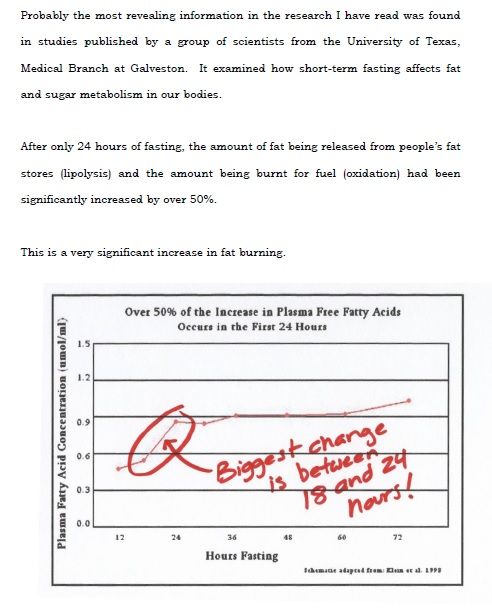Didn't get around to post the screen shot of the book yesterday, but here it is:


Log in to view your messages, post comments, update your blog or tracker.

loversghost wrote: I am going to try splitting the meals (but still staying within the guidelines and TDEE) a bit more so I eat more regularly and just as a self experiment see what it does - because what it seemed to be saying in that paper reflects what I have been finding. I'll be curious to see if it alters (ie slows down) weight loss - from the usual pound or so a week).
carorees wrote: Thanks for posting that...I've been able to find the abstract of the original study here: http://www.ncbi.nlm.nih.gov/m/pubmed/8238506
Following the related articles link from the above PubMed page revealed another article comparing the effect of fasting on men vs women: http://www.ncbi.nlm.nih.gov/m/pubmed/11701450 and the full paper here: http://ajpendo.physiology.org/content/281/6/E1333
This study found that the increase in fat burning with longer fasting (from 14 to 22 hours) was less in women than men.
So it seems that the optimal length of fast differs between men and women.
To match men and women on percent body fat, we recruited female subjects who were lean [body mass index (BMI) = 21 kg/m2 and 24% body wt as fat] and male subjects who were slightly overweight (BMI = 26 kg/m2 and 23% body wt as fat),
Michael H wrote: Let's see, perhaps I'm misinterpreting, but in http://ajpendo.physiology.org/content/281/6/E1333To match men and women on percent body fat, we recruited female subjects who were lean [body mass index (BMI) = 21 kg/m2 and 24% body wt as fat] and male subjects who were slightly overweight (BMI = 26 kg/m2 and 23% body wt as fat),

carorees wrote: I completely concur that there seems to be a kind of metabolic inertia in which the body resists changing from one fuel to another and so you are right that it's best not to break one's fast with a high carb meal as it's likely to cause high blood sugar...which is what has been found experimentally.
| Similar Topics |
|---|
Users browsing this forum: No registered users and 2 guests
Be healthier. Lose weight. Eat the foods you love, most of the time.

LEARN ABOUT FASTING
We've got loads of info about intermittent fasting, written in a way
which is easy to understand. Whether you're wondering about side effects or why the scales aren't budging, we've got all you need to know.
 ASK QUESTIONS & GET SUPPORT
ASK QUESTIONS & GET SUPPORT FREE 5:2 DIET PROGRESS TRACKER & BLOG
FREE 5:2 DIET PROGRESS TRACKER & BLOG